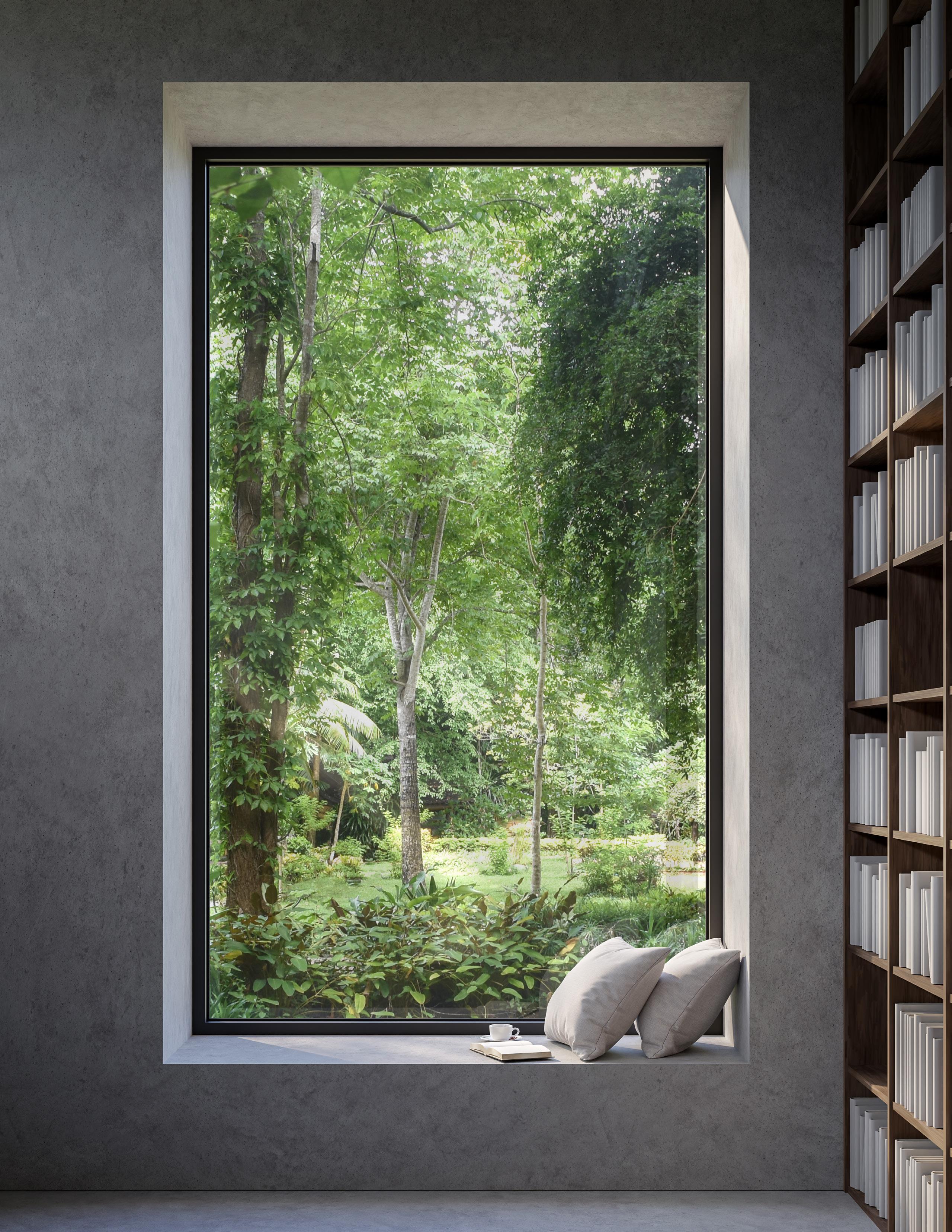DEMANDS OF A NEW AFFLUENT GENERATION


ADAPTING REAL ESTATE TO THE MODERN BUYER AND SELLER




WELCOME
STATE OF LUXURY REAL ESTATE | MAY 2023

We are thrilled to share Luxury Portfolio’s latest research report, offering valuable insights into the luxury home market, affluent clients’ preferences and trends shaping this exclusive niche. The aim is to equip real estate professionals with the knowledge and tools to better understand and cater to their discerning clientele.
The luxury real estate market is complex and multifaceted, with some segments witnessing strong demand and growth while others face stagnation or overvaluation.
Considering these fragmented conditions, alongside external factors such as high inflation, rising interest rates and a volatile stock market, it is crucial for industry professionals to comprehend the evolving preferences and expectations of luxury home buyers.
Herein is an in-depth research report examining the shifting dynamics of the luxury property market, revealing key trends, memorable moments and actionable steps for those working in this sector.
Some findings are remarkable.
For instance, women now represent 54% of luxury homeowners under 35, signaling a growing female presence in the market. Also, a whopping 91% of luxury homeowners are considering additional real estate investments, demonstrating their confidence in property ownership’s long-term potential.
Equally interesting is this nugget: 46% of luxury home buyers under 35 find social media advertising to be the most effective platform, stressing the significance of digital marketing strategies.
Many thanks to Chandler Mount, principal researcher for Luxury Portfolio and CEO of Affluent Consumer Research Company, for his work on this study. We encourage you to review our research report and apply the gained insights to your real estate practice. By embracing the identified trends and preferences, you can better position yourself for success in the luxury home market.
METHODOLOGY
This study aimed to analyze the luxury home market to understand the preferences of affluent clients. A survey was designed and administered to 1,419 wealthy individuals from 24 countries on five continents. Participants had a minimum income of USD $250,000 and an average primary home value of over USD $3,300,000.
The survey collected information on demographics, lifestyle preferences, decision-making factors, real estate portfolios, agent selection and media consumption habits. The data was analyzed using statistical methods and presented in a cohesive report to help real estate professionals better understand the trends in the luxury home market.
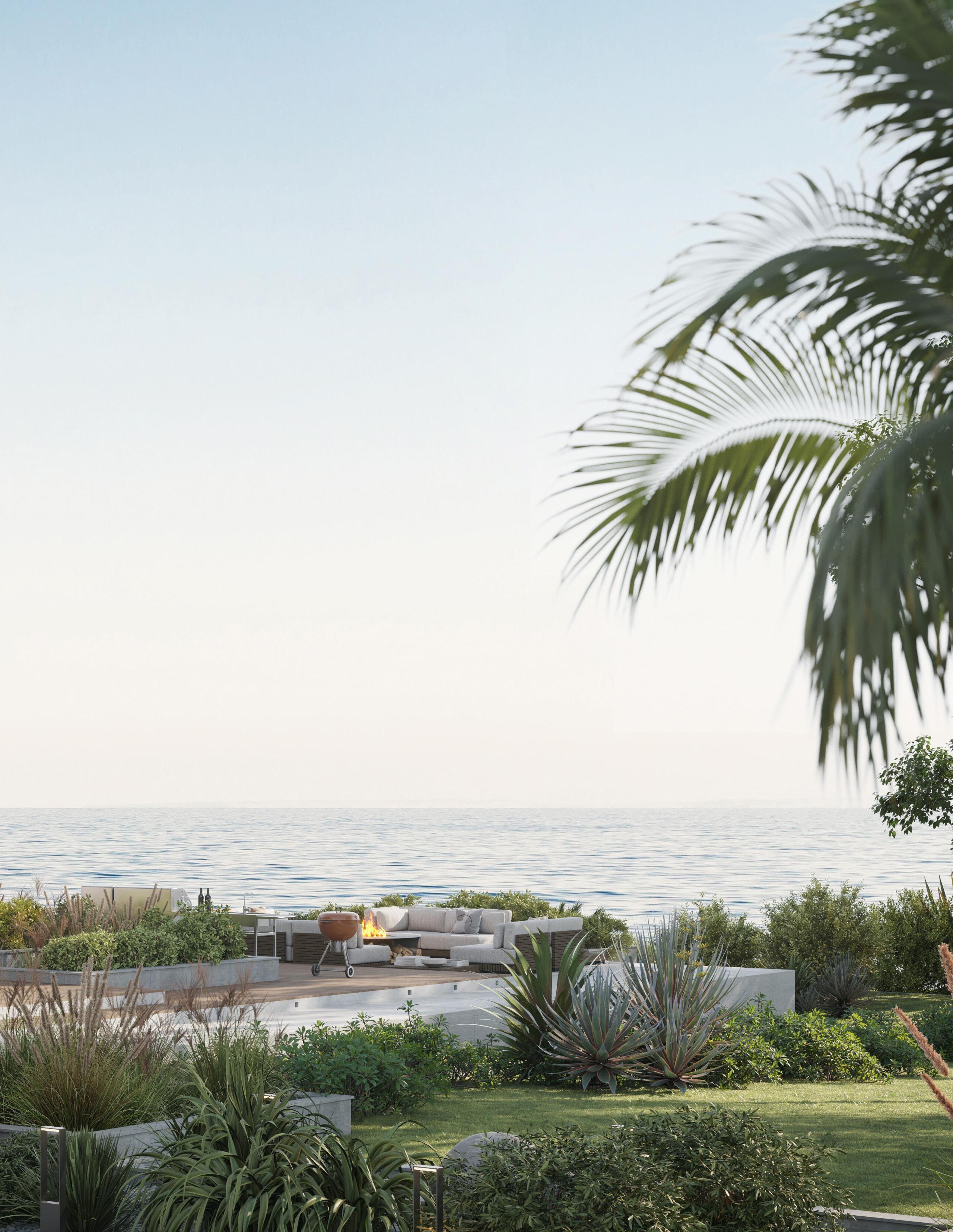
EXECUTIVE SUMMARY
DEMANDS OF A NEW AFFLUENT GENERATION: ADAPTING REAL ESTATE TO THE MODERN BUYER AND SELLER
SOLRE | MAY 2023
The luxury real estate market is undergoing a significant transformation, driven by the evolving preferences of younger affluent buyers.

This demographic shift has brought about changes in gender distribution, with women now accounting for 54% of luxury homeowners under 35 years old. Younger luxury homeowners are increasingly focused on sustainability, social responsibility, intergenerational wealth preservation and technology.
To succeed in this changing landscape, real estate companies must prioritize eco-friendly practices, socially responsible initiatives and digital marketing strategies.
Collaboration with popular luxury brands from other industries can help build familiarity and trust among potential buyers.
Providing exceptional customer experiences and personalized services is vital to retaining customers and attracting new ones across age groups.
By understanding the unique preferences of different generations of luxury homeowners, industry professionals can adapt their approach and create targeted marketing campaigns to ensure continued success in the luxury real estate market.
KEY FINDINGS
Women account for 54% of luxury homeowners under 35, indicating a significant female presence in the purchasing of luxury real estate.
Younger luxury homeowners (under 35) prioritize eco-luxury, legacy values and digital platforms more than middle-aged (35-64) homeowners.
Ninety-one percent of luxury homeowners across age groups are considering making additional investments in real estate, but younger homeowners are more likely to reduce their overall investment in real estate for diversification.
Younger luxury homeowners value social responsibility and brand-name recognition more than middle-aged homeowners.
INSIGHTS
Younger luxury homeowners are increasingly focused on sustainability, social responsibility and intergenerational wealth preservation.
Technology plays an essential role in attracting younger luxury homeowners, as they are more likely to rely on digital platforms for information and decision-making.
Both younger and middle-aged luxury homeowners value trust in real estate agents and appreciate personalized experiences and superior customer service.
IMPLICATIONS
1. 2. 3. 4. 1. 2. 3. 1. 2. 3. 4.
Real estate companies should prioritize sustainable practices and socially responsible initiatives to appeal to younger luxury homeowners.
Companies need to develop and maintain a strong online presence, leveraging digital marketing and social media strategies to reach tech-savvy buyers and sellers.
Collaboration with popular luxury brands from other industries can create familiarity and trust among potential buyers and improve marketing effectiveness.
DEMOGRAPHIC EVOLUTION: A New Era of Luxury Homeowners
The world of luxury homeowners is evolving, with new generations entering the market and bringing their unique preferences along with them. As the dynamics of luxury home ownership change, understanding these distinctions becomes crucial for those in the industry to continue catering to the modern luxury owner.
One of the key findings in Luxury Portfolio’s study is a significant shift in gender distribution among younger luxury homeowners.
While men make up the majority of owners aged 35-64 (59%), women account for 54% of those under 35 years old. This indicates a growing female presence in the luxury real estate market.
More women are climbing the corporate ladder and achieving financial success in their own right, with an equal percentage of men and women in corporate leadership (48%) reporting that they hold executive leadership positions. This is reflected in the changing demographics of luxury home owners.
In terms of education, younger luxury homeowners tend to hold lower levels of higher education degrees compared to their middle-aged counterparts, but they still boast impressive academic credentials.
Among luxury owners under 35 years old, 51% have a master’s degree or higher, while this figure stands at 62% for those aged 35-64. Overall, the younger generation remains a highly educated and ambitious group.

Another notable difference between the age groups lies in job titles and varying levels of responsibility.
Younger luxury homeowners tend to hold junior (23%) and executive (46%) positions, while middle-aged owners lean more towards senior (24%) and executive roles (51%). This suggests that younger individuals are making significant strides early in their careers, acquiring luxury homes at a faster pace than previous generations. This follows a broader trend among the affluent that the ‘first luxury experience’ is happening earlier in life now for today’s young people compared to generations past.
Luxury experiences were reserved for special occasions and accomplishments (such as a Rolex watch for 20 years of service at a company). Millennial and Gen Z consumers experience luxury almost daily (where they live, the vacations they take, the cars they ride in).
A deeper look at the evolving demographics of luxury homeowners and what it means for the industry
The study also highlights differences in relationship status between the two age groups.
A significant 18% of luxury homeowners under 35 are single, compared to just 6% of those aged 35-64. Moreover, 77% of younger owners are married, which is 11 points lower than the middle-aged group. These results point towards a shift in social tendencies, as younger generations prioritize both individual success and financial security before settling down.
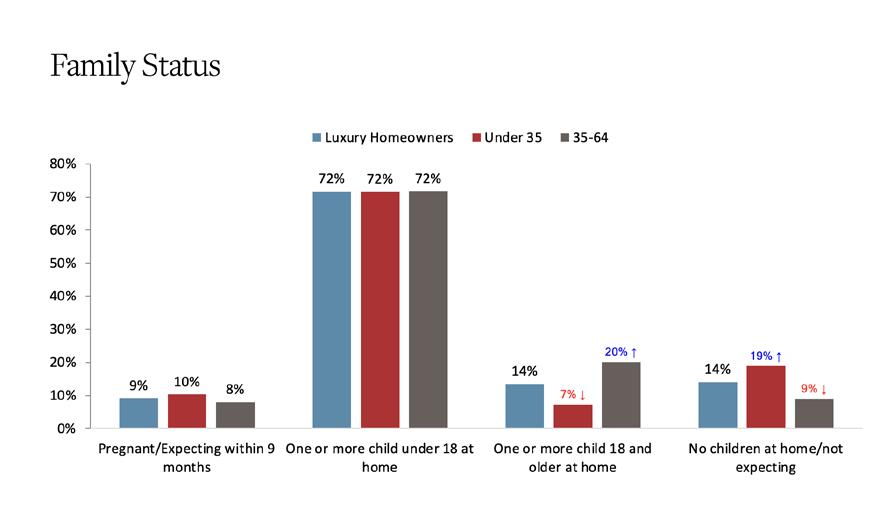
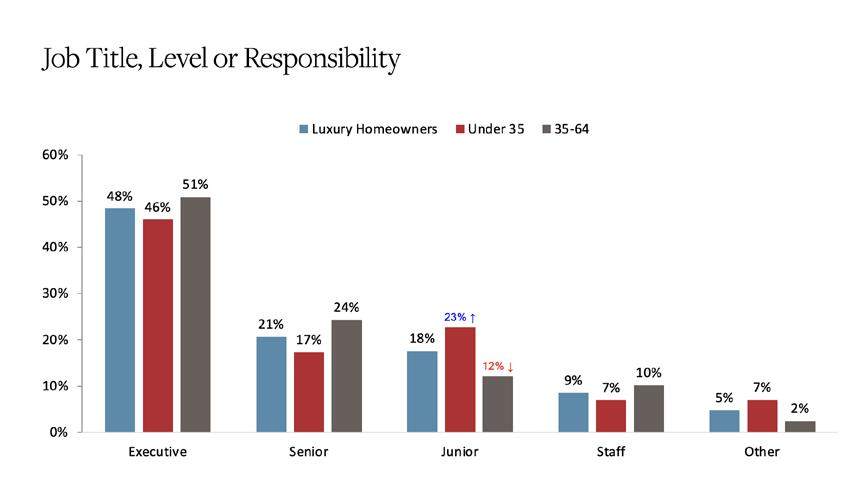
Luxury brands outside the real estate sector are also taking note of these demographic shifts, tailoring their offerings to cater to a younger, affluent clientele. Brands such as Tiffany & Co., for instance, have revamped their marketing strategies to appeal to the next generation of luxury consumers.

Tiffany & Co.’s 2021 “Not Your Mother’s Tiffany” campaign repositions the brand to appeal to younger, affluent clients. Featuring celebrities such as A$AP Ferg, the campaign highlights its modern collections. To engage millennials and Gen Z, Tiffany uses digital platforms such as Instagram and offers virtual consultations. Additionally, the brand focuses on sustainability and social responsibility, sharing traceability information for its diamonds. By embracing these strategies, Tiffany & Co. aims to connect with the next generation of luxury consumers.
In conclusion, the landscape of luxury home ownership is transforming, as younger generations rise to prominence in the market. Understanding these changes will be paramount for industry professionals seeking to adapt and succeed in this shifting environment.
Key Takeaways
An increasing number of women own luxury homes
Younger luxury homeowners tend to be well-educated
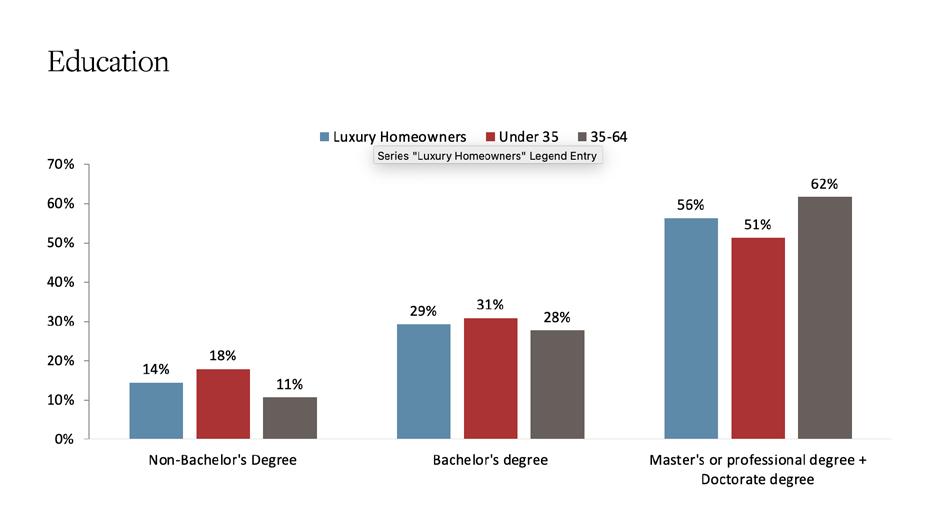
Luxury homes are purchased earlier in careers by young individuals
Many young luxury homeowners are single or unmarried
Major companies target young, affluent buyers for luxury goods and services
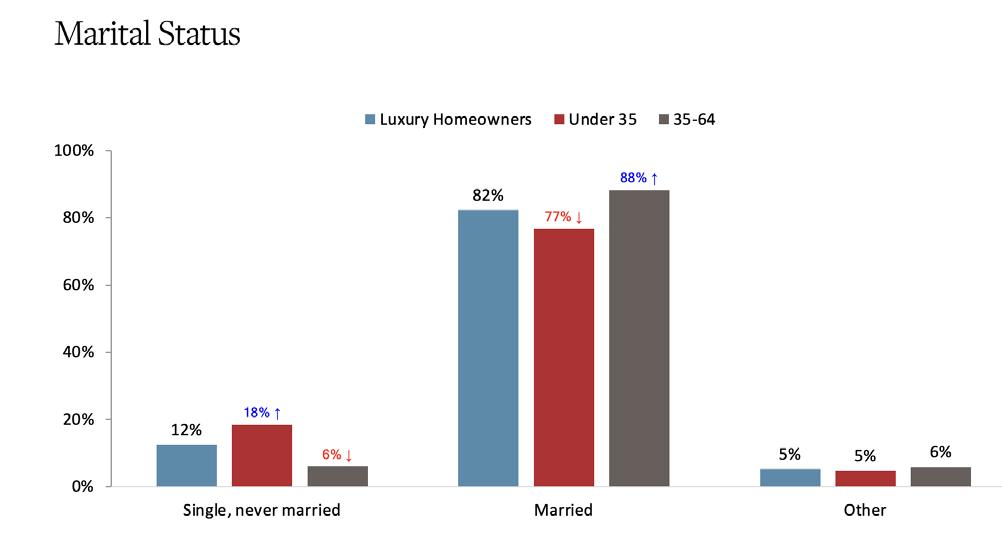
THE FAST TRACK TO LUXURY HOME OWNERSHIP:
Why Younger Generations are Getting Ahead
A look at the factors enabling younger individuals to acquire luxury homes earlier than their predecessors
1.EARLY WEALTH ACCUMULATION
Today’s young professionals often accumulate wealth earlier in their careers, thanks to booming industries such as technology and finance. High-paying jobs in these sectors enable younger individuals to save for substantial down payments, expediting their path to luxury home ownership.
2.INHERITANCE AND FAMILY SUPPORT
Some younger luxury homeowners receive financial assistance from their families, either through inheritance or direct support. This can provide a leg-up in the competitive real estate market, allowing them to purchase luxury properties sooner than they might have been able to on their own.
The shift in luxury home ownership towards younger generations begs the question: How are these individuals managing to acquire high-end properties faster than previous generations?
Several factors have contributed to this trend, creating unique opportunities for younger buyers to enter the luxury market

As these six factors converge, younger individuals are poised to continue making significant inroads into the luxury real estate market. Understanding the drivers behind this trend can help industry professionals better cater to the evolving needs and preferences of these up-and-coming homeowners.
INVESTMENT MINDSET
Younger generations are increasingly aware of the value of real estate as an investment. They may prioritize home ownership over other expenditures, such as travel or luxury goods, viewing property as a long-term asset that can appreciate over time.
6. 4
LOW INTEREST RATES
REMOTE WORK OPPORTUNITIES
Historically low interest rates – 2023 shocks not withstanding – have made it more affordable for younger buyers to secure mortgages and enter the housing market. This favorable financial climate has facilitated the early acquisition of luxury homes by younger individuals. 5 3
The rise of remote work has given younger professionals the flexibility to live in more affordable areas while still earning high salaries. This has opened new possibilities for luxury home purchases in desirable locations that were once out of reach.
EDUCATION AND FINANCIAL LITERACY
Financial education and literacy are increasingly emphasized for younger generations, who may be savvier when it comes to navigating the complexities of real estate transactions. This can give them a competitive edge when it comes to securing their dream homes.
PROMINENT LIFESTYLE TRENDS: Eco-Luxury and Legacy Values Emerge
A fusion of exclusivity, social responsibility and intergenerational wealth preservation
The luxury market has always fascinated people with its opulence, exclusivity and originality. Luxury Portfolio’s new data on the preferences of luxury homeowners reveals a shift toward embracing sustainable practices and focusing on wealth preservation for future generations.
While daily-living practices are similar by age groups, with 85% using reusable bags while shopping and reusable mugs and water bottles almost every time, the younger demographic is more intent on making lasting changes in the home. Luxury homeowners under 35 show an increased affinity for socially responsible practices in the home itself compared to their middle-aged counterparts.
As sustainability gains more prominence in luxury lifestyles, brands are striving to align with these values.
For example, Stella McCartney, a pioneer of sustainable high fashion, underscores the importance of combining luxury and eco-friendliness in her designs.
Sustainability at Home
Stella McCartney is a trailblazer in sustainable high fashion, showcasing that luxury and eco-friendliness can coexist.
Ms. McCartney’s “Green Carpet Collection” in 2012 featured elegant garments made from sustainable materials and she ensures ethical production and labor practices.
Incorporating technology and innovative design, she created a luxurious and environmentally responsible brand, inspiring others in the industry to adopt sustainable practices.
We are witnessing a significant shift in luxury homeowners’ preferences, particularly among the younger generation. They expect the brands they patronize to be socially responsible and environmentally conscious.
Apart from sustainable living, younger luxury homeowners also display strong interest in home automation systems.
Smart home appliances are favored by 51% in this age group, compared to 50% in the 35-64 category. Integrated music systems are preferred by 45% of under-35s, significantly higher than the 34% of the middle-aged segment.
Luxury homeowners have increasingly high expectations when it comes to home service providers.
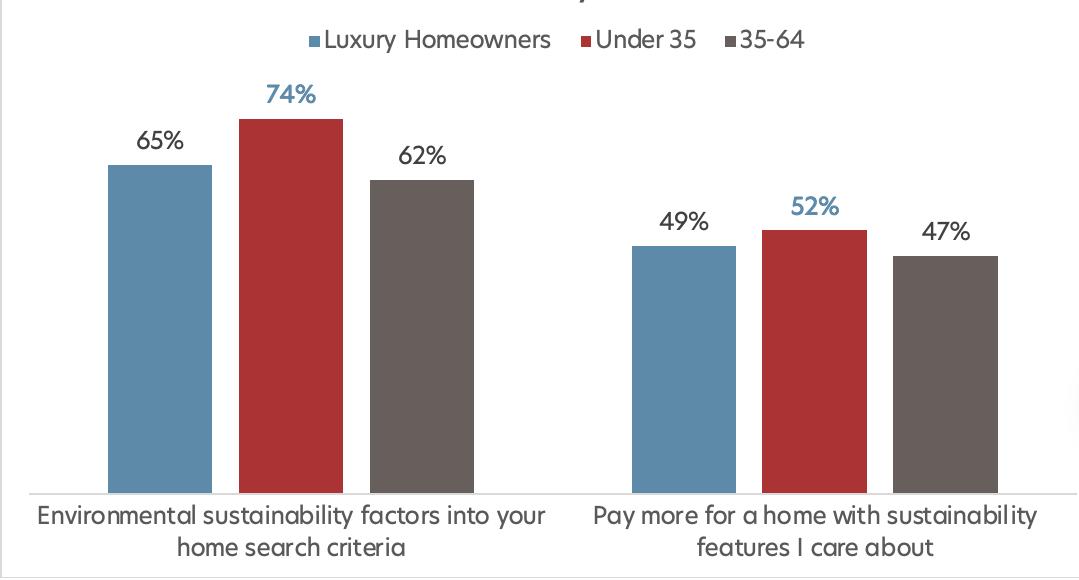
Demand for personal and household services rises significantly higher with age, as the 35-64 age group balances many competing time constraints. Specifically, personal assistants become even more important over time for the 35-64 age group (56%) compared with the under-35s (43%).
This rise in demand for personalized, luxury home services is being met by skilled individuals and brands such as Quintessentially, which offers tailor-made lifestyle management and concierge services to affluent clients.
Understanding the aspirations and goals of luxury homeowners is crucial for brands seeking to tap into this lucrative market.
A striking 92% of under-35s prioritize family financial security and continuity, compared to 87% in the middle-aged segment.
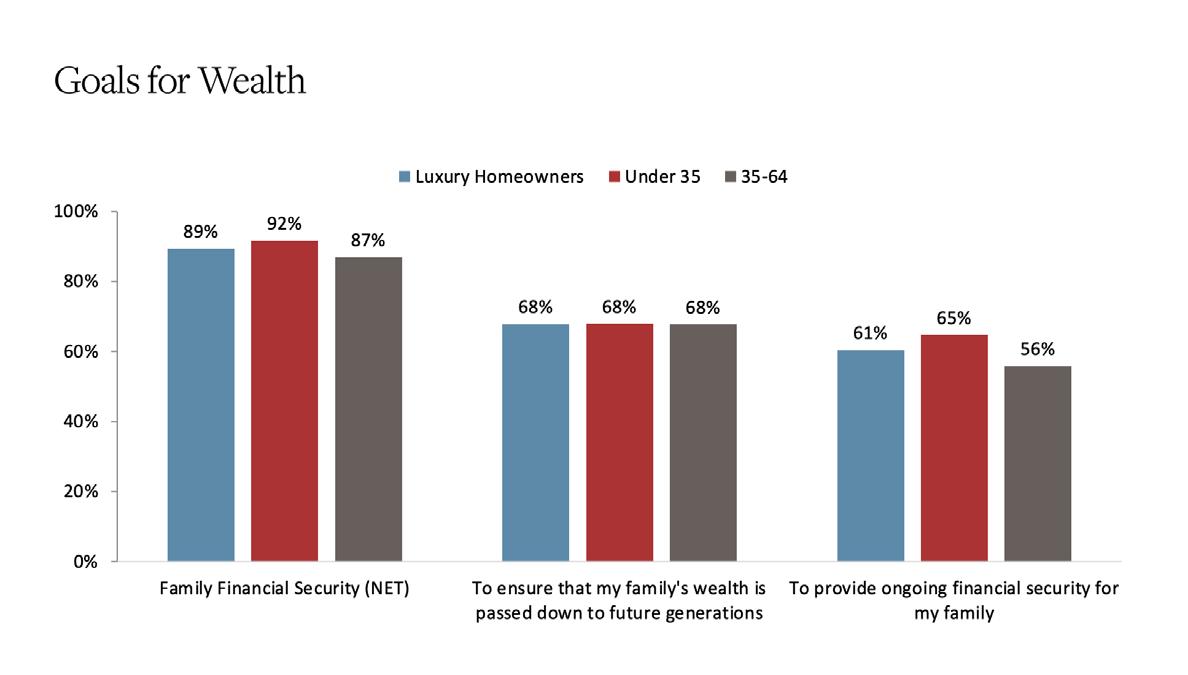
Younger homeowners also emphasize business legacy and value preservation (59%) over philanthropy and social impact (53%).
Luxury homeowners now seek a balance between preserving their wealth and ensuring the well-being of their families.
This mindset has broad implications for how luxury brands need to communicate with their audience.
One such brand addressing this desire for legacy preservation is Patek Philippe, a renowned Swiss watchmaker known for its tagline: “You never actually own a Patek Philippe. You merely look after it for the next generation.” The watch brand’s message resonates strongly with luxury homeowners who value intergenerational wealth preservation.
In an age where luxury lifestyles are evolving and embracing sustainability, brands and service providers must adapt to meet the expectations of their discerning clientele.
By offering products and services that blend exclusivity, social responsibility and legacy values, the luxury industry can continue to captivate and inspire generations to come.
Key Takeaways
Young affluent individuals prioritize eco-friendliness and sustainability
These consumers prefer reusable items such as bags and water bottles
Luxury brands are adapting to offer eco-friendly products for these buyers
Young affluent consumers enjoy smart gadgets for convenience in their homes
As they age, luxury homeowners seek assistance for busy lives by hiring personal assistants
Family wealth and preserving businesses for future generations are important values
Luxury brands emphasize the heirloom quality of their products
For continued interest, luxury companies must offer unique, environmentally friendly and heritage-worthy items





REAL ESTATE INVESTMENTS:
How Portfolios Differ by Age
Luxury Homeowners’ Investment Outlook
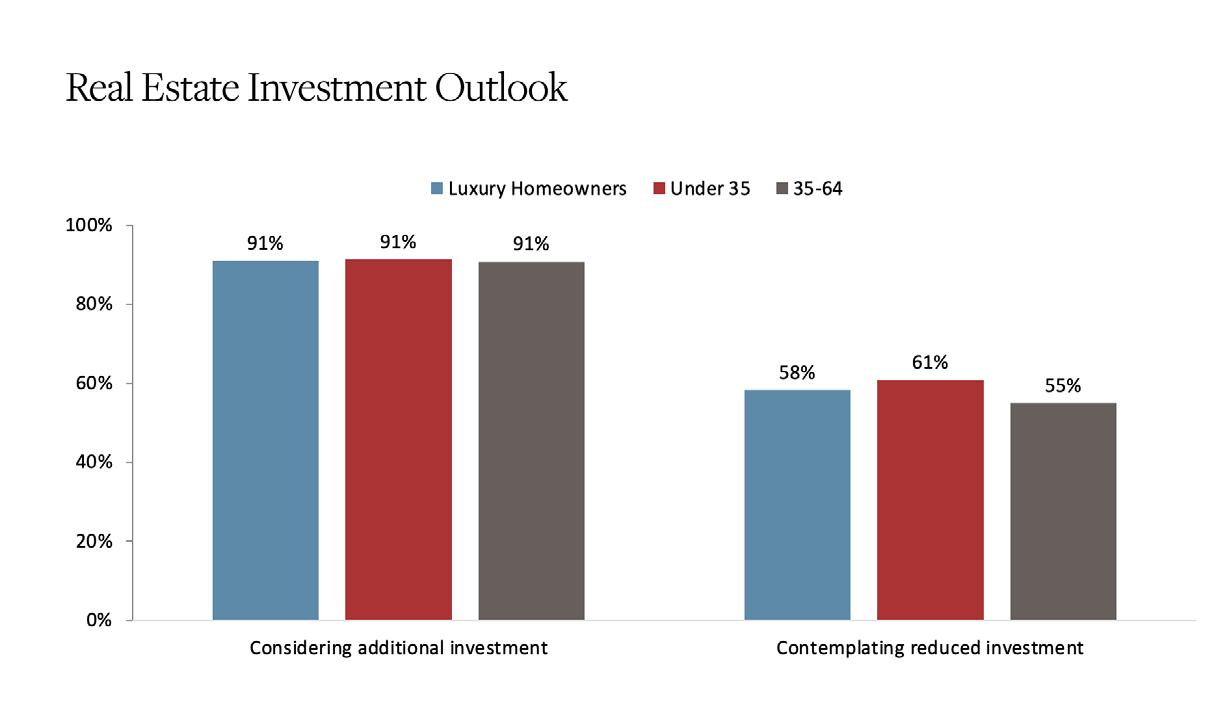
As the luxury real estate market evolves, understanding the preferences and investment strategies of high-end homeowners becomes increasingly vital.
Luxury Portfolio research has revealed some intriguing insights into the intentions of luxury property owners, particularly when comparing different age groups.

Here, we delve into the most noteworthy topics emerging from this data, uncovering stories that illustrate the importance behind these trends while offering a glimpse into the future and potential of luxury real estate investments.
The Future of Real Estate Investments: A Generational Perspective
A striking 91% of all luxury homeowners are considering making additional investments in real estate. This reflects a strong appetite for upscale properties among both younger and middle-aged individuals, with only a 1% difference between the two age groups.
The allure of luxury properties transcends generational boundaries, as affluent individuals across all age brackets recognize the long-term value of investing in premium real estate.
Despite this shared enthusiasm for real estate investments, there is a marked contrast when it comes to reducing existing holdings. Sixty-one percent of luxury homeowners under 35 are pondering reducing their overall investment in real estate, compared to just 55% of those aged 35-64.
This apparent discrepancy – 91% adding and 61% reducing their positions in real estate – is in fact the real estate market itself. Without both sides – buyers and sellers – the marketplace would not exist.
What may be more telling is the fact that desire to increase position is nearly universal, while just over half will sell off parts of their portfolio In essence, the demand curve remains in favor of the seller as prime property and inventory remains a scarce resource.
The demand curve remains in favor of the seller as prime property and inventory remains a scarce resource
A Balancing Act: Portfolio Diversification and Risk Management
The six-point spread between younger and older buyers contemplating reducing their real estate portfolio (61% versus 55%) hints at the divergent approaches to risk management and portfolio diversification among the two age groups.
Luxury homeowners under 35 may be looking to secure their financial future by spreading investments across various asset classes, while their middle-aged counterparts could be more confident in their residential real estate holdings as a source of long-term stability.
Younger luxury homeowners likely have a longer investment horizon and may be more open to experimenting with various asset allocations. This could explain their inclination to reduce residential real estate investments in favor of exploring other investment opportunities.
A possible parallel can be drawn to the fashion industry, where luxury brands such as Louis Vuitton diversify their offerings across a range of products – from apparel to accessories – to cater to ever-changing consumer preferences.
The 2017 Louis Vuitton and Supreme collaboration exemplifies diversification in fashion. By partnering, the brands tapped into new markets, with Louis Vuitton reaching younger demographics and Supreme elevating its image. The collection blurred lines between high-end and casual fashion, attracting diverse customers and generating buzz. This highlights the importance of luxury brands evolving and adapting to changing consumer preferences, exploring partnerships, and incorporating innovations while maintaining quality.”
Conclusion
The future of luxury real estate investments is shaped by the decisions of discerning homeowners across generations.
As Luxury Portfolio’s analysis reveals, there is a strong appetite for upscale properties among both younger and middle-aged individuals, but their approaches to risk management and portfolio diversification differ significantly.

Understanding these generational nuances is essential for real estate professionals seeking to anticipate market trends and cater to the evolving needs of their clients.
Successfully navigating the luxury property landscape requires a deep understanding of the different investment strategies employed by various age groups.
Only then can we truly grasp the full scope of opportunities within this dynamic market.
RESIDENTIAL REAL ESTATE PORTFOLIO
The world of luxury real estate is vast and dynamic, with preferences and ownership trends varying across age groups.
Here, we look at the fascinating differences between luxury homeowners under 35 and those aged 35-64, highlighting their unique perspectives on property ownership and revealing insights that could potentially reshape the luxury property market.
Extended-family Properties: The New Frontier for Young Luxury Homeowners
In a surprising twist, data shows that 52% of luxury homeowners under 35 own extended-family properties, compared to 38% of those aged 35-64 – a notable difference of 13 percentage points.
Younger generations place a higher value on family and communal living, which has translated into a growing preference for extended-family properties
Residential Real Estate Owned: Extended-family Property
College/University Property Investments: The Future of Luxury Real Estate?

Another intriguing finding is the significant difference in the ownership of college/university properties between the two age groups.
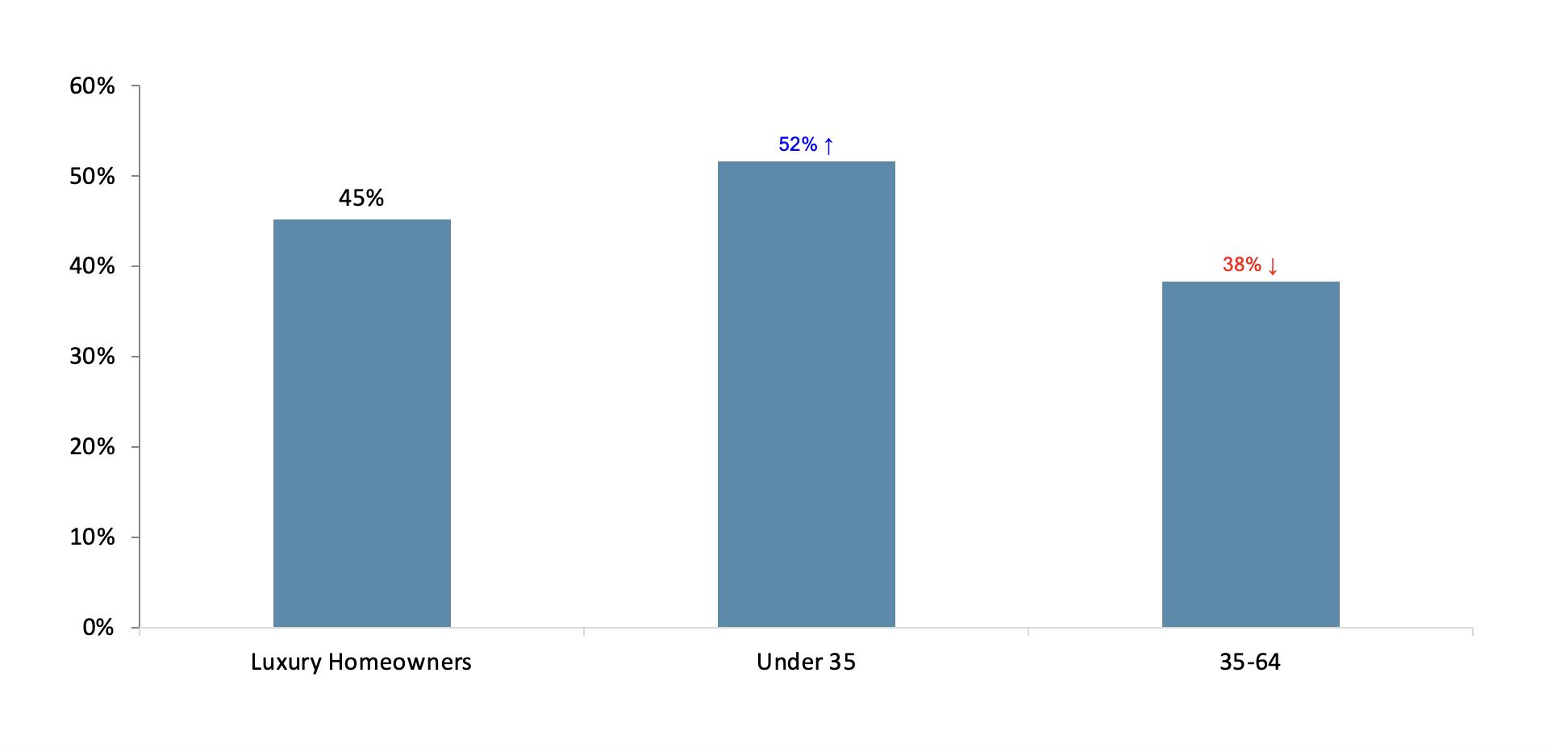
While only 9% of luxury homeowners aged 35-64 own such properties, a staggering 22% of those under 35 have ventured into this market – a difference of 13 percentage points.
This trend might be driven by younger generations’ focus on education and investment in their children’s future.
By owning college/university properties, these young luxury homeowners are not only securing prime real estate but also investing in the future success of the next generation.
Weekend/Retreat Properties: The New Status Symbol?
While vacation properties remain popular among both age groups, weekend/retreat properties have emerged as a new status symbol for luxury homeowners under 35. The data highlights a 10-percentage point difference, with 33% of younger homeowners owning weekend/retreat properties compared to just 23% of their middle-aged counterparts.

These younger buyers are looking for more than just a place to escape their busy lives. They are seeking exclusive experiences and one-of-a-kind retreats that allow them to unwind while enjoying luxurious amenities and stunning locations.
Residential Real Estate Owned: Weekend/Retreat Property

COMMERCIAL REAL ESTATE PORTFOLIO
Office Space: A Tale of Two Cities
Office space remains a popular choice for luxury homeowners, with 41% of them holding investments in this area.
However, when parsed by age group, there is a noteworthy difference between those under 35 (45%) and those aged 35-64 (37%).
Such disparity may be attributed to young entrepreneurs who are drawn to tech startups and coworking spaces, while their middle-aged counterparts tend to favor more traditional settings.
Multi-Family Dwellings: The Modern Urban Jungle
The allure of multi-family dwellings as an investment keeps growing among luxury homeowners regardless of their age.
With 40% of investors under 35 and 37% of those between 35-64 years old investing in multi-family properties, it is clear that these assets remain an attractive option for both generations. This could be linked to the increasing demand for urban living, as more consumers seek to reside close to their work, leisure and socializing spots.
Virtual Ventures: Metaverse Real Estate Takes Center Stage
One of the most striking differences observed lies within the realm of digital property.
Metaverse or digital real estate investments show a fascinating divergence, with 25% of investors under 35 and only 19% of those aged 35-64 putting their money into this new frontier. This reflects the growing interest in virtual reality and online spaces, such as Decentraland, where digital real estate is bought, sold and developed.
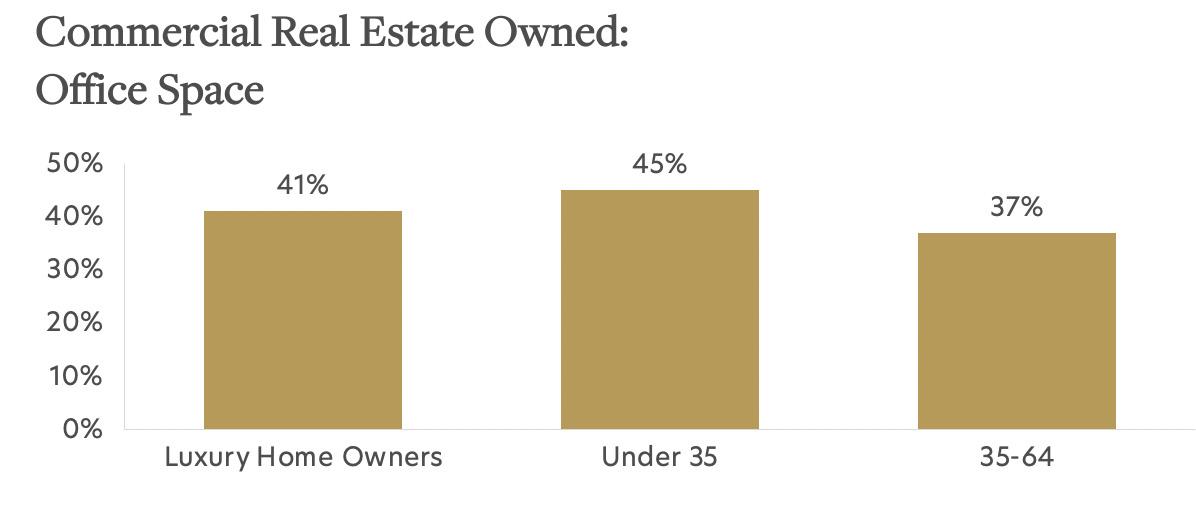
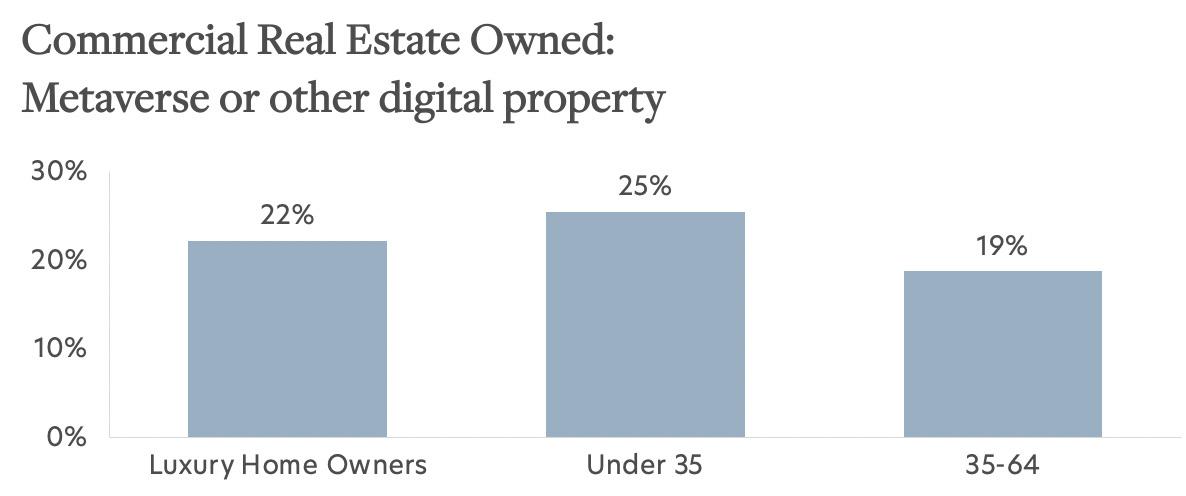
Digital luxury brands such as Gucci have already ventured into the metaverse, creating unique experiences for their customers. As more luxury brands adapt to this virtual revolution, it is likely that the gap between younger and middle-aged investors in digital real estate will continue to widen.
As the world embraces new forms of luxury, so do the investment preferences of luxury homeowners.
The rise of metaverse real estate and the continued popularity of office space and multi-family dwellings showcase the diversity and adaptability of luxury homeowners when it comes to commercial property investments.
Key Takeaways
Luxury homes are popular among both younger and middle-aged affluent buyers.
Younger buyers prefer large family homes, college properties and weekend retreats.
Wealthy people of all ages invest in office spaces and upscale apartment buildings.

Virtual land investments attract more young affluent consumers compared to older ones.
Different age groups have unique preferences, shaping the future of luxury real estate.

AGENT SELECTION:
Technology and Details Matter
Luxury Portfolio’s study of global luxury homeowners examines how age impacts the selection of real estate agents
The luxury real estate market is evolving rapidly, with digital technology and access to exclusive services playing an increasingly important role. The life stage of buyer plays a significant role in shaping their priorities.
Luxury homeowners under the age of 35 have different expectations than their middle-aged counterparts. They are more likely to prioritize technology and brand affiliation when choosing a real estate agent.
According to the study, younger luxury homeowners are 13 percentage points more likely to value an agent’s adept use of high-tech tools such as virtual staging and online marketing.
Digital marketing and social media strategies ranked higher among under-35s, who also placed a stronger emphasis on real estate agents’ brokerage brand affiliation.
In contrast, luxury homeowners aged 35-64 prioritize attention to detail and knowledge of the local market, ranking them 7 and 9 percentage points higher, respectively, than their younger peers. These findings suggest that more experienced homeowners appreciate the importance of agents thoroughly understanding the market landscape.
Unsurprisingly, referrals from friends and family remains a popular resource across age groups when searching for a new agent.
However, particularly for younger homeowners, online reviews and social media platforms are becoming increasingly vital. This shift towards digitization emphasizes the importance of agents maintaining a strong online presence.

Regardless of age, one aspect remains constant: trust in the agent.
An overwhelming 82% of luxury homeowners indicate that they would likely work with the same agent from their last transaction – a testament to the enduring value of excellent client service.
In the luxury market, exceptional customer service and reputation are essential for success.
The study also reveals that luxury homeowners are not solely focused on the real estate industry.
Many of them admire luxury brands outside the sector, such as Rolls-Royce Motor Cars or Tiffany & Co., which consistently deliver quality products and services. These brands set a benchmark for luxury real estate agents who strive to exceed client expectations.

The Rolls-Royce Boat Tail, launched in May 2021, exemplifies luxury and innovation in the automotive industry. This $28 million bespoke creation, limited to three units, showcases the brand’s commitment to customization through a four-year design process involving close collaboration with clients. Luxury real estate agents can learn from Rolls-Royce’s approach by offering personalized property searches, collaborating on dream home designs, and providing white-glove services for HNW clients.
As the luxury real estate landscape continues to evolve, it is crucial for agents to adapt their approach and cater to the diverse needs and preferences of their clients.

Embracing technology, maintaining a strong online presence and providing exceptional customer service remain key factors in attracting and retaining clients across all age groups.
Key Takeaways
Younger buyers prioritize technology and brand, while older buyers focus on details and local knowledge.
Trust in the agent is important for all luxury home buyers.
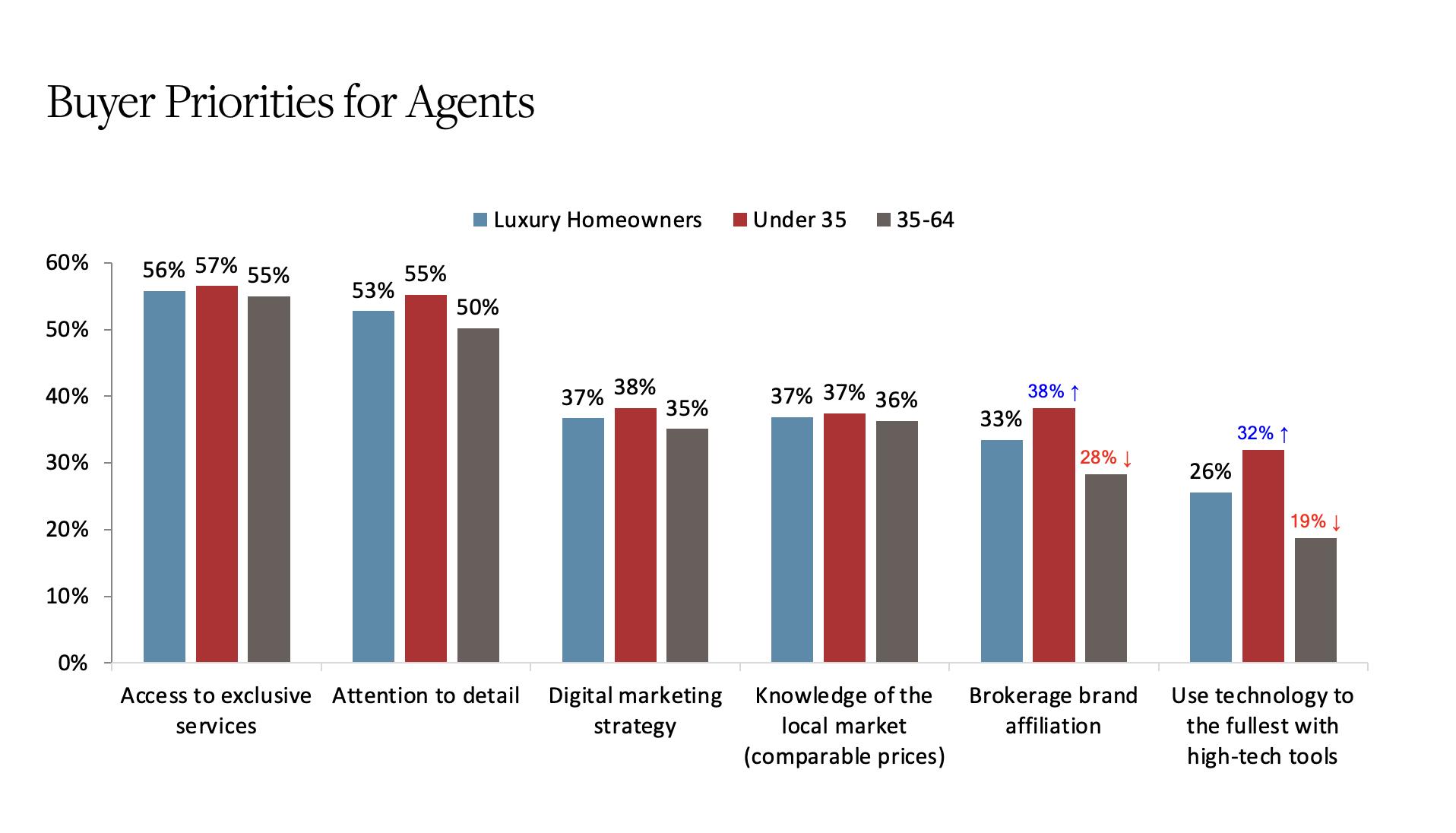
Good customer service is vital to attract and retain clients.
Luxury home buyers admire high-quality brands outside of real estate.
A strong online presence for agents is crucial to appeal to clients.
DIGITAL MARKETING: Luxury Home Buyers Seek Digital Connection and Expertise
Luxury Portfolio’s study of global luxury homeowners examines how age impacts the selection of real estate agents
In an ever-evolving real estate landscape, it is essential for luxury home sellers and their agents to understand the preferences of potential buyers.
As younger, tech-savvy individuals enter the market, marketing strategies must be fine-tuned to accommodate their proclivities.
When buying real estate, both those under 35 and those 35-64 prefer inperson visits, which remains consistent across the board at 38%.
However, the importance of real estate professionals differs significantly, with 43% of under-35 luxury home buyers relying on them, compared to just 32% of those aged 35-64. This 12-point difference highlights the growing importance of professional advice and expertise for younger investors.
Online content plays a major role in how younger buyers discover and engage with luxury real estate.
Luxury Portfolio’s study shows that 46% of luxury home buyers under 35 find social media advertising to be the most effective platform, with online video advertising not far behind at 44%. These platforms surpass traditional TV commercials, which are considered more effective by only 31% of the same age group.
Regarding the type of content featured on luxury real estate social media accounts, luxury home buyers under 35 are most interested in photos and videos of properties (49%) and expert advice on buying and selling luxury real estate (39%).
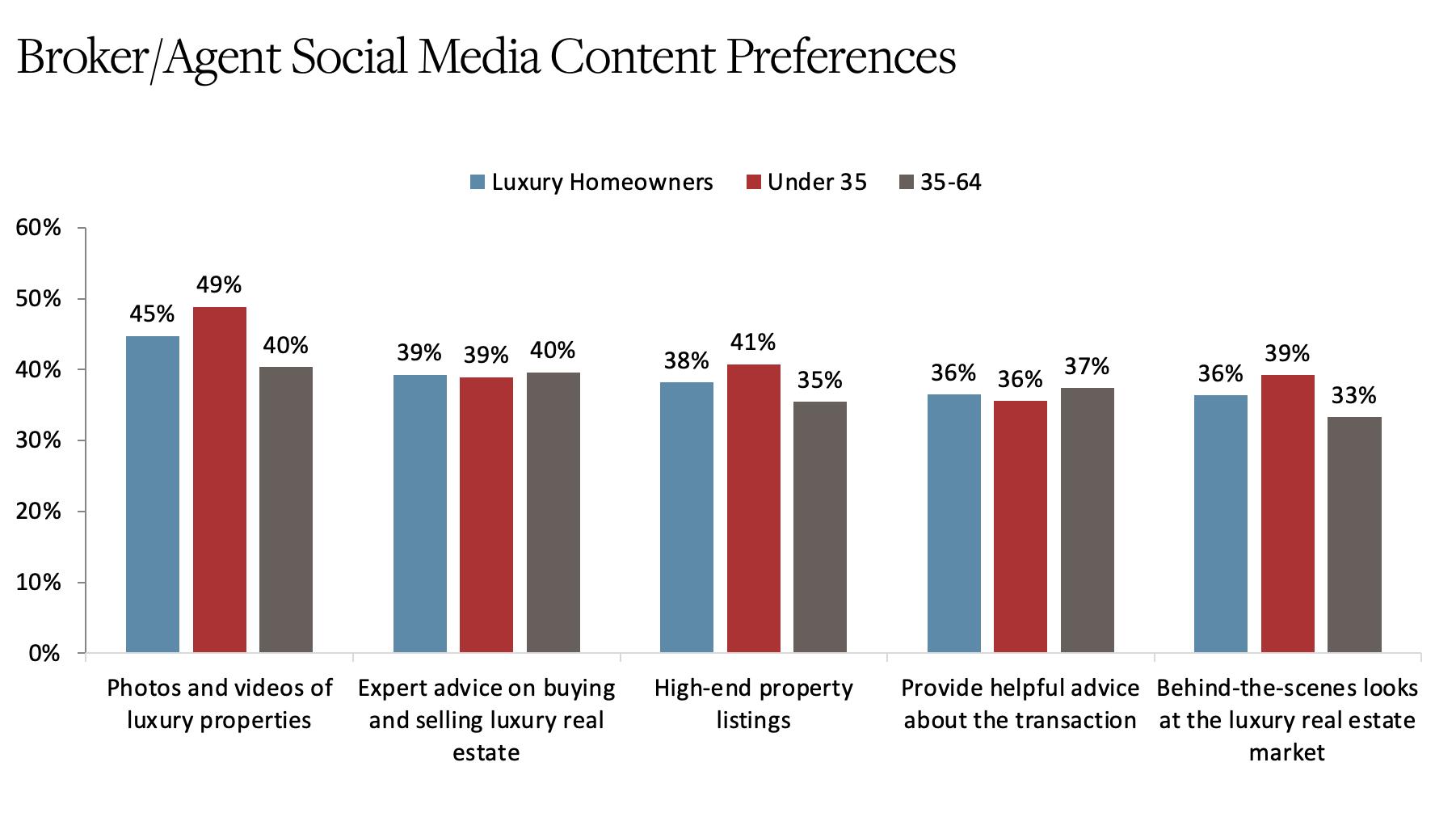
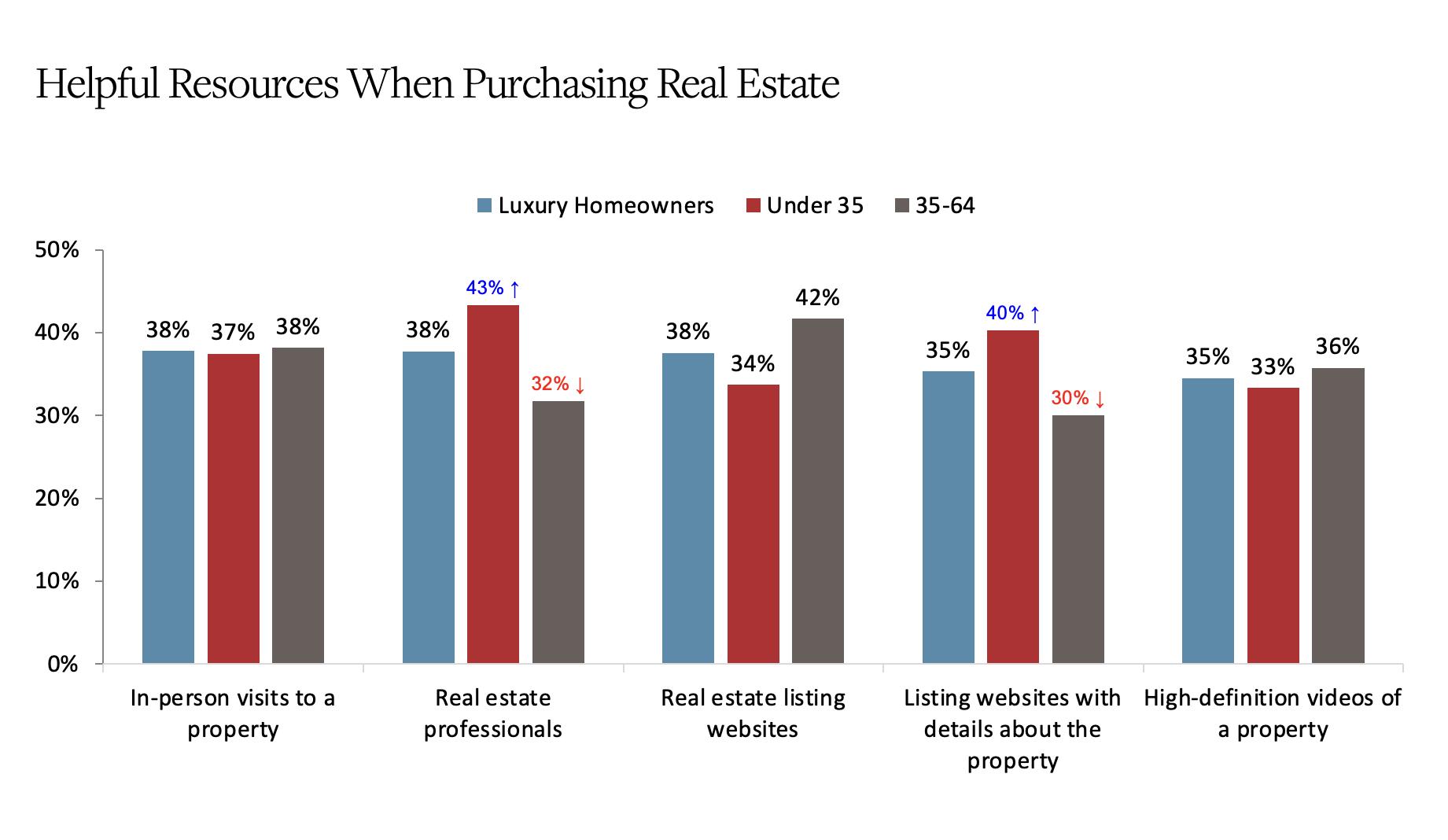
These consumers also appreciate a professional tone (60%), showcasing the importance of a polished image.
This aligns with brands such as Four Seasons Hotels and Resorts, which has successfully integrated an air of sophistication and luxury into its online presence.
Four Seasons Hotels and Resorts revamped its online presence with a redesigned website and mobile app offering personalized features, and collaborated with TCS World Travel to create a virtual reality experience previewing its luxurious private jet journeys. These efforts reflect the brand’s commitment to hospitality excellence through showcasing advanced technology and exclusive offerings for a seamless online experience.
In terms of content format, live-streaming video stands out as the most popular choice across all age groups, with 52% of respondents preferring this medium. This highlights the need for luxury real estate professionals to capitalize on platforms such as Instagram Live or Facebook Live to showcase their listings and create engaging virtual experiences for potential buyers.

Current luxury home buyers are looking for more than just impressive properties. They want access to expert advice and engaging digital experiences that cater to their unique needs. Real estate professionals must adapt their marketing strategies and leverage cutting-edge technology to stay ahead of the game.

By incorporating these marketing insights, luxury real estate professionals can better connect with high-end buyers, offering a seamless experience akin to what other luxury brands, such as Rolex, Tesla, Chanel and Louis Vuitton, are known for delivering.
As the lines between digital and physical continue to blur, the companies and agents who understand and adapt to these shifting preferences will be poised to succeed in the competitive luxury real estate market.
Key Takeaways
Luxury home buyers prefer in-person visits. Still, live-streaming videos are popular among these buyers
Younger buyer value advice from real estate professionals more than buyers ages 35+
Expert tips on buying and selling are always appreciated
A seamless digital experience is expected
High-quality images and content attract them
Online property photos and videos are important
Social media advertising is effective for them
LUXURY BRANDS: Originality, Exclusivity and Social Responsibility
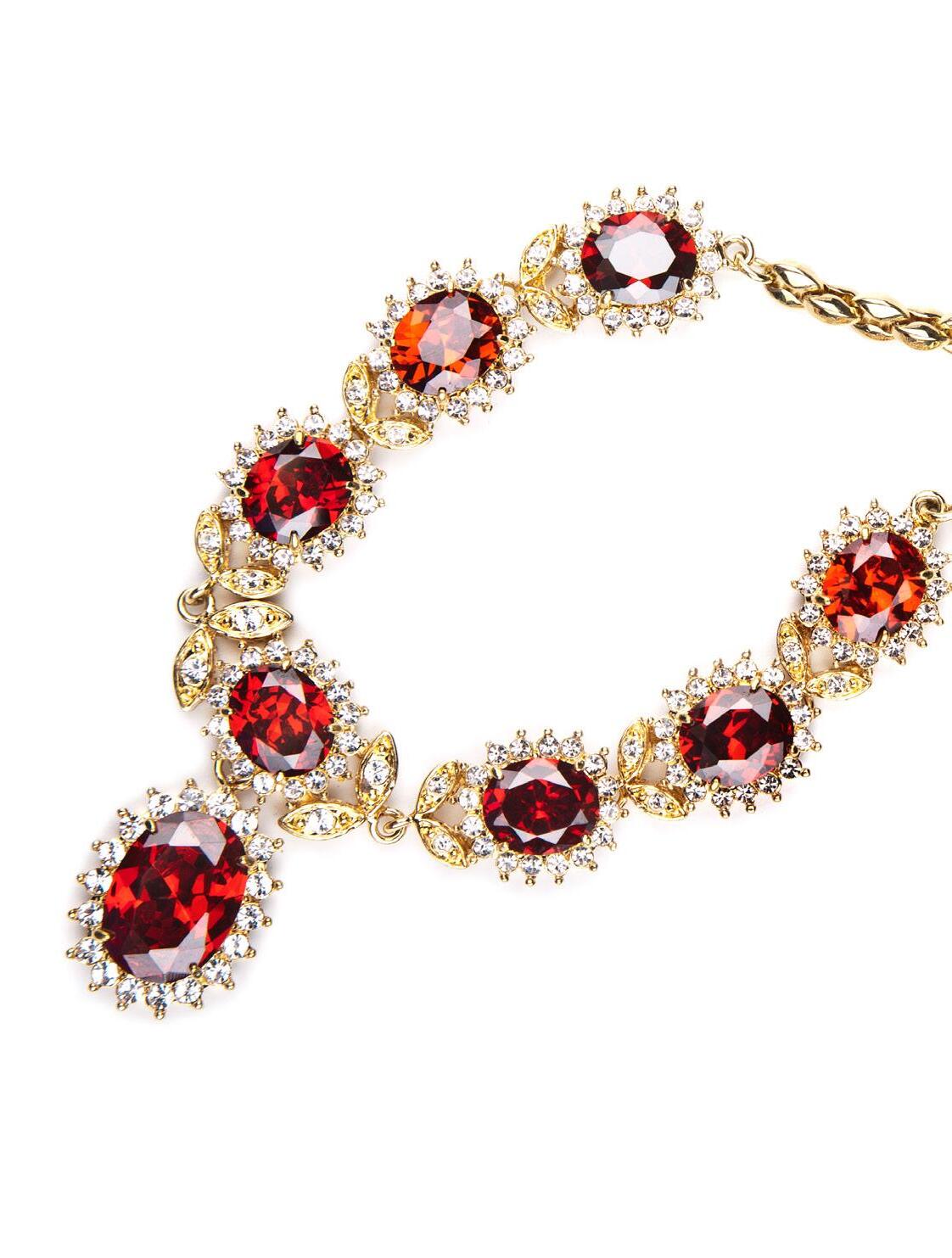
Younger affluent buyers prioritize social responsibility and brand recognition
The luxury market continues to evolve as the preferences of, and demands from, luxury homeowners shift, with a focus on originality, exclusivity and social responsibility.
Originality and exclusivity topped the list of qualities that luxury homeowners expect from brands, with 44% and 38%, respectively, citing these traits as important. Reputation for excellence and socially responsible business practices followed closely behind at 36%.
Interestingly, Luxury Portfolio’s study found that younger luxury homeowners (under 35) prioritize social responsibility and brand-name recognition more than their middle-aged counterparts (aged 35-64).
The difference between the age groups was 11 points for social responsibility and 13 points for exclusivity. This suggests that luxury brands should focus on sustainable and ethical practices to appeal to the next generation of affluent consumers.
Luxury homeowners are currently looking for brands that not only deliver exceptional quality but also align with their values. This is especially true for younger buyers, who are more conscious about sustainability and social impact.
In the realm of customer brand loyalty, the study found that Louis Vuitton (apparel/fashion), Armani (apparel/fashion) and Gucci (leather goods) were the leading brands for luxury homeowners.
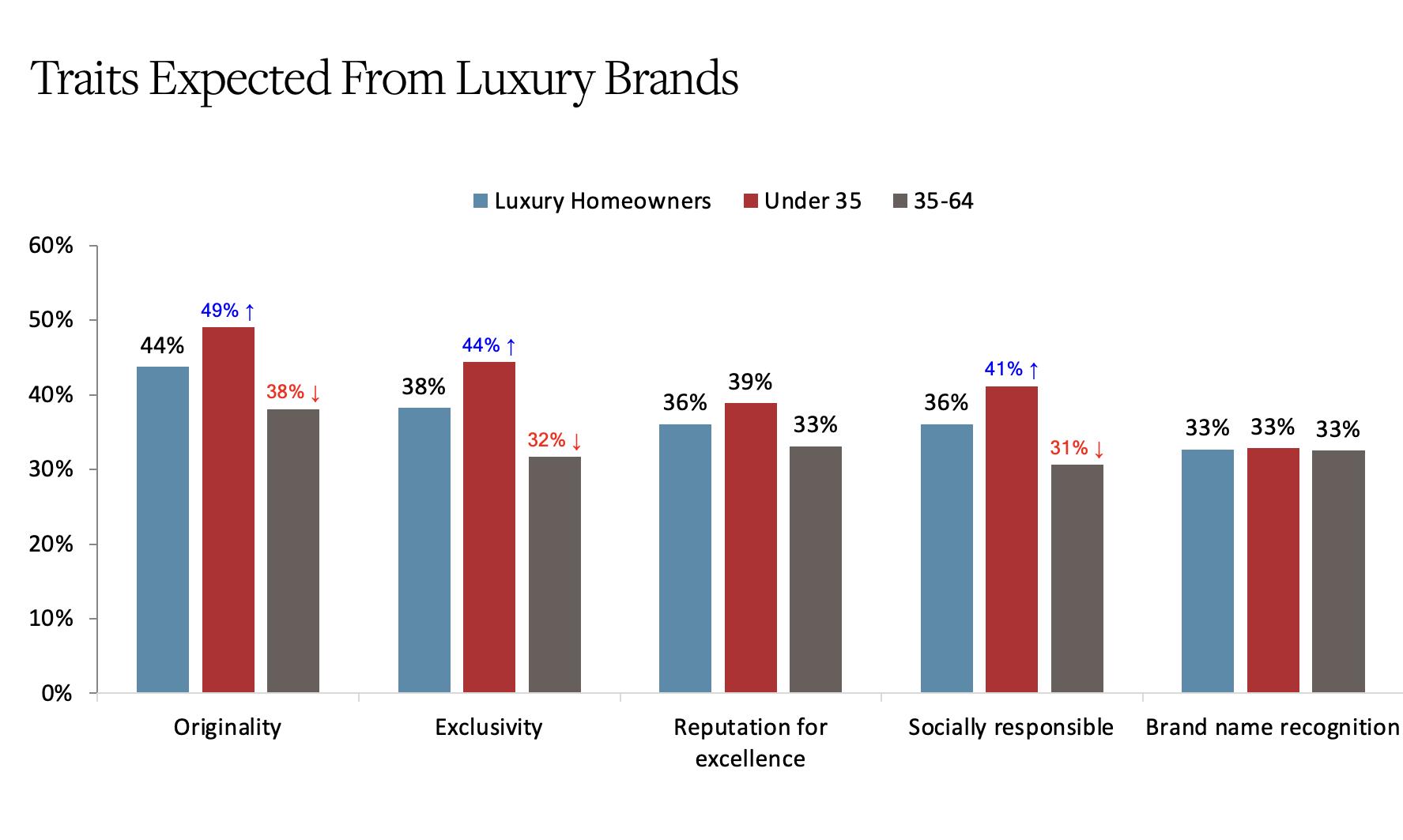
However, with many respondents indicating that they would seriously consider other brands in the future, there is an opportunity for new and emerging luxury businesses to capture market share.
The luxury landscape is constantly changing, and brands need to adapt to stay relevant.
Gucci reinvented itself to remain relevant in the luxury industry, focusing on gender-fluid designs, bold patterns, digital platforms, collaborations, sustainability and social responsibility. By adapting to changing consumer preferences and expanding into new product categories, Gucci has reestablished itself as a top luxury brand with wide appeal.
By understanding the preferences of different age groups, businesses can tailor their offerings and marketing strategies to better cater to these discerning customers.
In conclusion, to thrive in today’s competitive luxury market, brands should focus on originality, exclusivity, social responsibility and personalized experiences.
By catering to the specific preferences of different age groups, they can foster long-term loyalty and growth.
A Note to Real Estate Professionals
Your role goes beyond high-end properties. Affluent buyers and sellers prioritize a luxurious lifestyle, investing significant time, money and attention into themselves and their families’ needs and wants. To effectively cater to their unique preferences, it is crucial to broaden your knowledge about the various luxury brands and products they use in their daily lives.

By becoming familiar with the holistic luxury market, you will be better equipped to provide exceptional service and connect with clients on a deeper level. Integrating this knowledge into your profession ensures you consider their overall luxurious lifestyle when dealing with real estate transactions. In doing so, you create tailored experiences that meet their high expectations and ultimately help you succeed in building strong relationships within this exclusive niche.
Key Takeaways
Originality: Affluent consumers buying luxury homes desire one-of-a-kind and special items
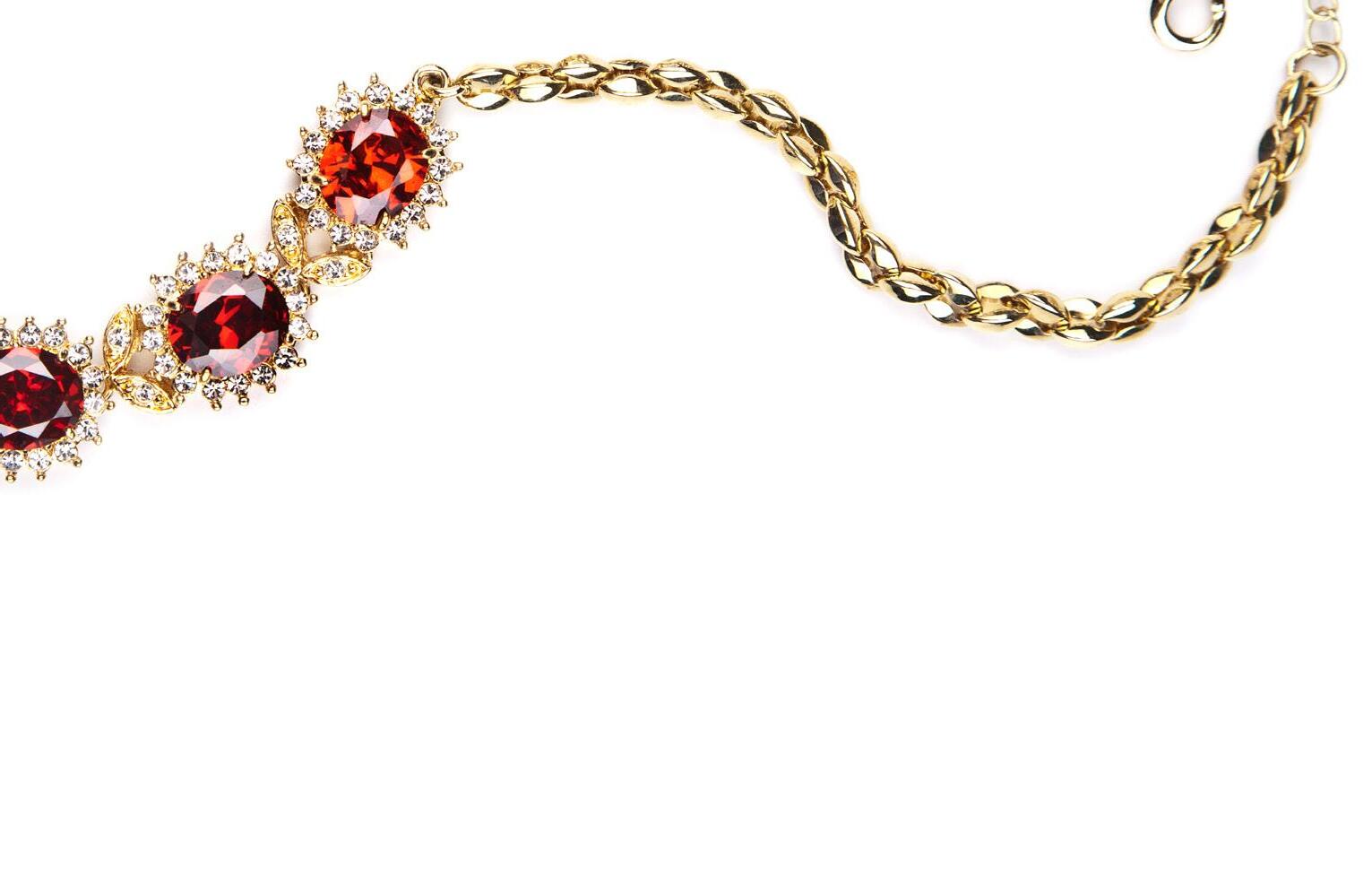
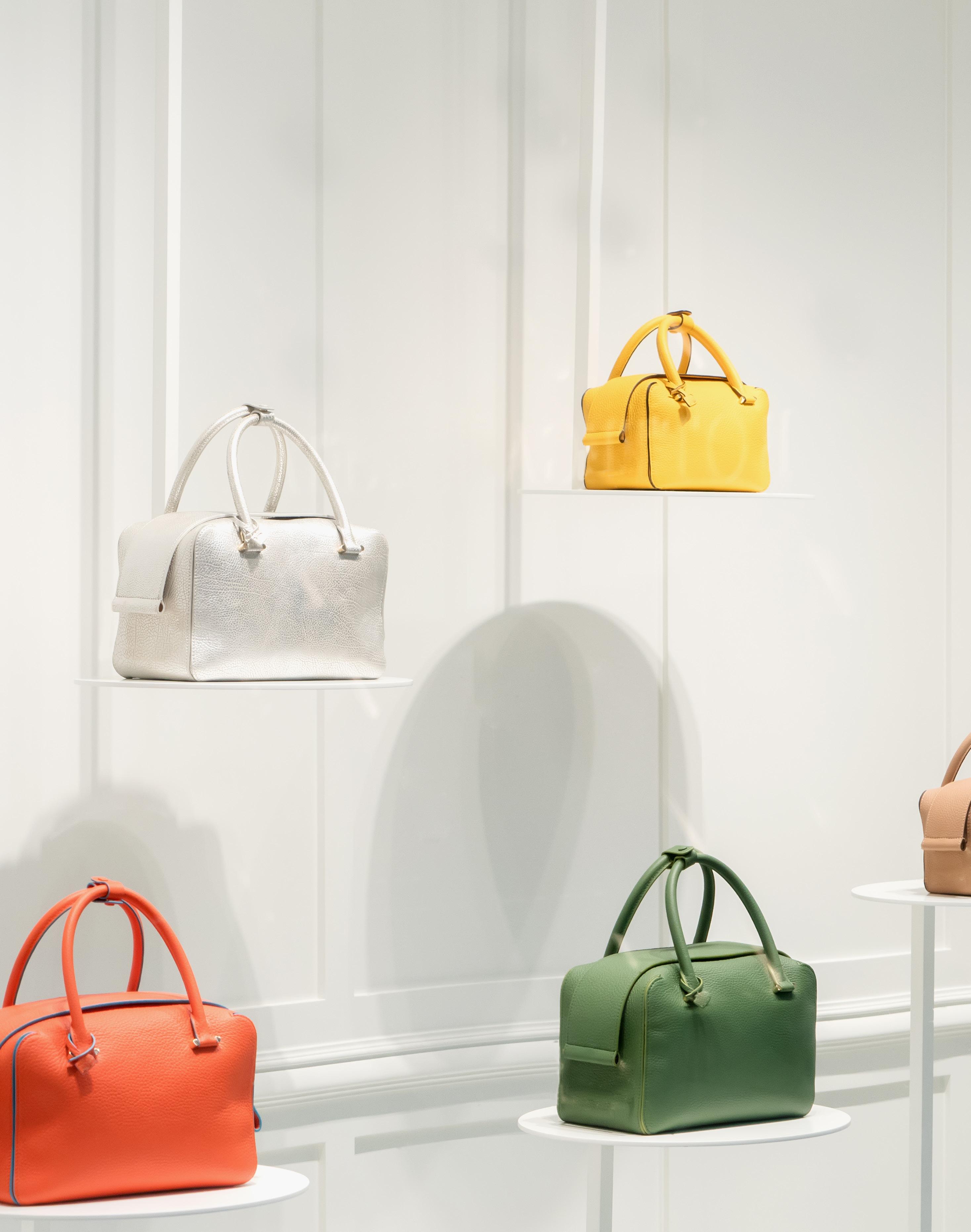
Exclusivity: They prefer items that are limited and rare
Social responsibility: They are concerned with protecting the environment and supporting society
Personalized experiences: They appreciate unique experiences tailored to their needs
Younger wealthy individuals value famous brands and positive actions more
High-quality customer service matters to them
LEADING LUXURY BRANDS: In the World of Luxury
Homeowners
Customer loyalty and future considerations in the exclusive real estate market
In today’s increasingly competitive luxury market, understanding customer loyalty and future brand consideration is crucial for businesses across various sectors. This is no different for the high-end real estate industry, where knowing what drives client commitment and future interest is essential for success.
Apparel and fashion take center stage as some of the most prominent luxury industries, with brands such as Louis Vuitton boasting an impressive 69% of loyal customers and future consideration.
The apparel and fashion industry, particularly brands such as Louis Vuitton and Armani, have managed to garner a significant amount of customer loyalty through consistent quality and innovation. Luxury real estate professionals can learn from these brands’ strategies to better understand their potential clients’ preferences.
However, the findings of Luxury Portfolio’s study also reveal that industries such as real estate, vacation rentals and financial services tend to have lower average customer loyalty. It is essential for professionals in these sectors to address this issue and focus on improving their core customer experience.
Real estate professionals can learn from other luxury industries, especially when it comes to leveraging brand associations.
For instance, collaborating with popular luxury automobile brands such as Porsche – which possesses a greater number of customers considering the brand in the future compared to its current loyal clients – can create a sense of familiarity and trust among potential buyers.
Building relationships with professionals or influencers in other luxury industries, such as high-end cars, yachts and private air travel, can lead to valuable referrals and strategic brand partnerships.
In the luxury real estate market, brand loyalty is a significant factor to consider when catering to the preferences and expectations of potential clients. According to the LPI survey, 19% of luxury homeowners are loyal to one or more brands in the real estate category. While this percentage may not seem overwhelmingly high, it nevertheless plays a crucial role in understanding the mindset and behavior of luxury consumers.

TOP 25 BRANDS: CUSTOMER LOYALTY TODAY
1. Louis Vuitton (Apparel/Fashion)
2. Armani (Apparel/Fasion)
3. Gucci (Leather Goods)
4. Moncler (Apparel/Fashion)
5. Louis Vuitton (Leather Goods)
6. Dior (Apparel/Fashion)

7. Chanel (Beauty)
8. Tom Ford (Apparel/Fashion)
9. Chanel (Apparel/Fashion)
10. Brioni (Apparel/Fashion)
11. Saint Laurent (Apparel/Fashion)
12. Chanel (Leather Goods)
13. Dolce & Gabbana (Leather Goods)
14. Ralph Lauren (Apparel/Fashion)
15. Brunello Cuccinelli (Apparel/Fashion)
16. Porsche (Auto)
17. Fendi (Apparel/Fashion)
18. Gucci (Apparel/Fashion)
19. Hermès (Apparel/Fashion)
20. Thom Browne (Apparel/Fashion)
21. McLaren (Auto)
22. Kiton (Apparel/Fashion)
23. Balenciaga (Apparel/Fashion)
24. Aston Martin (Auto)

25. Audi (Auto)
1. Louis Vuitton (Apparel/Fashion)
2. Chanel (Apparel/Fashion)
3. Armani (Apparel/Fashion)
4. Moncler (Apparel/Fashion)
5. Gucci (Leather Goods)
6. Ralph Lauren (Apparel/Fashion)
7. Gucci (Apparel/Fashion)
8. Dior (Apparel/Fashion)
9. Hermès (Apparel/Fashion)
10. Chanel (Leather Goods)
11. Porsche (Auto)
12. Brunello Cuccinelli (Apparel/Fashion)
13. Hermès (Leather Goods)
14. Balenciaga (Apparel/Fashion)
15. Rolex (Jewelry/Timepieces)
16. Louis Vuitton (Leather Goods)
17. Fendi (Apparel/Fashion)
18. Louboutin (Leather Goods)
19. Kiton (Apparel/Fashion)
20. Bentley (Auto)
21. Lamborghini (Auto)
22. Saint Laurent (Apparel/Fashion)
23. Audi (Auto)
24. Prada (Leather Goods)
25. JPMorgan Chase & Co. (Wealth Management)
TOP 25 BRANDS: POSITIONED FOR THE FUTURE
To begin with, luxury homeowners tend to be discerning individuals who value quality, exclusivity and unique experiences. They are likely to have specific tastes and preferences. In the luxury real estate market, this translates into bespoke properties that provide offer unparalleled levels of comfort, style and convenience.
The fact that 20% of luxury homeowners under the age of 35 are brand loyal in the real estate category indicates that younger luxury clients are beginning to establish strong connections with their preferred brands. This presents an opportunity for luxury real estate developers and marketers to engage with this demographic and build long-lasting relationships.
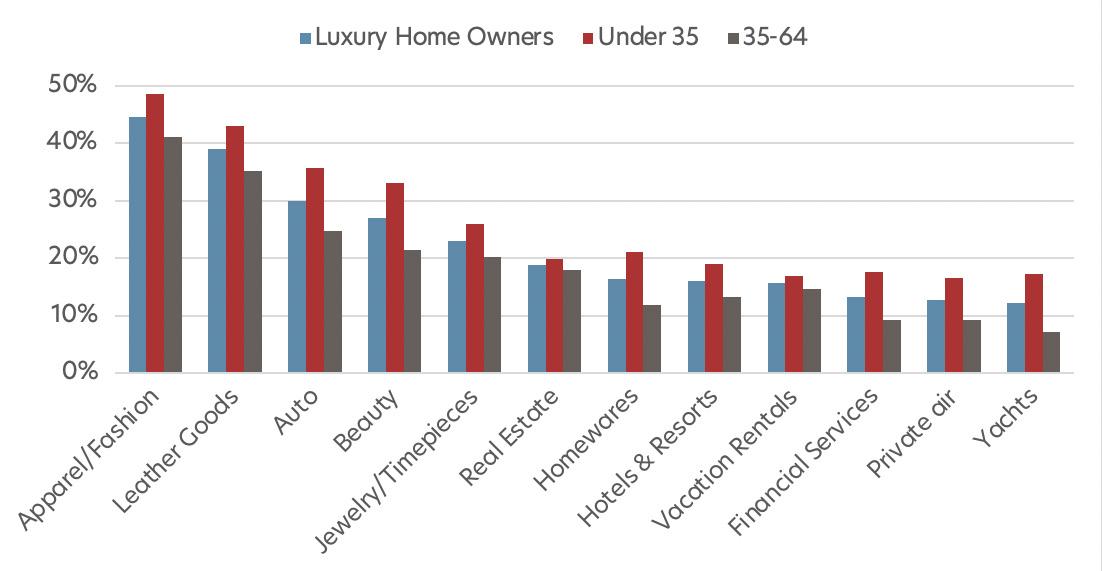
On the other hand, the statistics reveal that brand loyalty among homeowners aged 35-64 stands at 18%. Although this figure is slightly lower compared to the younger demographic, it still highlights the importance of nurturing relationships with clients in this age group. These clients have likely had more experience in the luxury real estate market and may be more resistant to change. Therefore, it is essential for luxury real estate brands to consistently deliver exceptional quality and service in order to maintain and strengthen these relationships.
Moreover, it is important to consider that luxury homeowners are likely to have brand loyalty in other categories as well, such as apparel/fashion, leather goods and automobiles. This implies that the concept of brand loyalty extends beyond real estate and influences other aspects of their lifestyle. Luxury real estate brands can capitalize on this by forming strategic partnerships with complementary luxury brands, thereby offering an integrated and seamless luxury experience to their clients.
Real estate professionals can look to successful luxury brands such as Chanel for inspiration – the beauty sector of the company experiences a higher percentage of loyal customers than those who would consider the brand in the future. Focusing on personalized services, attention to detail, and going above and beyond to meet clients’ needs can make a significant difference in retaining customers and attracting new ones.
Ultimately, staying informed about trends and shifts in customer loyalty across industries is crucial for luxury real estate professionals. By understanding their target audience’s preferences, refining their marketing strategies and fostering strategic partnerships, they can enhance their foothold in the exclusive world of affluent homeowners.

Key Takeaways
Younger generations entering the market:
Appreciate well-known brands for clothing and accessories
Place high importance on quality and stylish designs
May not be as devoted to real estate or vacation rental companies
Enjoy luxury items such as cars, boats and private planes
Value personalized customer service
Connect with others who share their affluent lifestyle
Keep an eye on trends and may shift preferences for favorite brands
FINAL THOUGHTS: Embracing change for future success
The luxury real estate market is undergoing a significant demographic shift as younger generations, particularly women, increasingly enter the market. These affluent homeowners prioritize originality, exclusivity, social responsibility and technology in their preferences.

To cater to this new audience, real estate professionals must adapt their marketing strategies, leverage digital platforms and collaborate with popular luxury brands outside of the real estate sector.
Moreover, focusing on providing personalized experiences, exceptional customer service and embracing sustainability can attract younger, environmentally conscious customers.
As the landscape of luxury home ownership continues to transform, staying informed about trends and shifts in customer loyalty across industries and adjusting strategies accordingly will be essential for industry professionals seeking to succeed in this ever-evolving market.
REMEMBER:
Want unique high-end homes and features
Care about social responsibility and eco-friendliness
Are tech-savvy and prefer digital platforms
Value personal connection and great customer service
Enjoy collaborating with luxury brands outside real estate
Younger generations entering the market: 1. 2. 3. 4. 5. 6.
Seek exclusivity and originality in their homes
